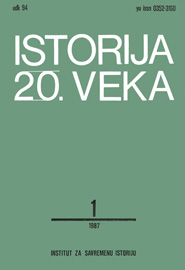KPJ I SKUPŠTINSKI IZBORI 1925. GODINE
THE CPY AND THE ASSEMBLY ELECTIONS OF 1925
Author(s): Milica TripkovićSubject(s): Political history, Recent History (1900 till today), Interwar Period (1920 - 1939), History of Communism
Published by: Institut za savremenu istoriju, Beograd
Keywords: Kingdom of Yugoslavia; politics; CPY; KPJ (Communist Party of Yugoslavia); assembly elections; interwar period; 1925; Pašić-Pribićević government; HRSS; IWPY;
Summary/Abstract: Despite the difficult conditions in which the Communist Party of Yugoslavia (CPY) was operating, its leadership nevertheless decided to take part - in the Assembly elections set for 8 February 1925. These special elections were the consequence of the unstable internal political situation in the Kingdom of Serbs, Groats and Slovenes; concretely, the new Pašić-Pribićević government was aiming to secure a parliamentary majority through elections under its control. The CPY had great difficulties in organizing its election activities because, at the end of 1924, the Pašić - Pribićević government had banned the work of the Independent Worker’s Party of Yugoslavia (IWPY) through which the CPY had been legally operating for a certain period. The CPY leadership saw its real chance in the elections in linkage and close election cooperation with the Croatian Republican Peasant Party (HRSS), on the basis of creating a worker-peasant bloc, which was in accordance with the decisions and instructions of the Comintern. The CPY leadership did not attempt to establish cooperation with other peasant parties, but directed all its energy to negotiations with the HRSS, so that election success was, practically, linked with the formation of an alliance with the latter party. The hopes of the CPY leadership that S. Radić's trip to Moscow and the inclusion of the HRSS in the Peasant International were more than a mere tactical move calculated to strengthen Radić's position in relation to the radicals and the Court, proved to be unfounded. Since all the attempts to conclude an electoral alliance with the HRSS collapsed, the IWPY went to the elections alone. The IWPY’s election - results were weak: it did not win one seat in the Assembly. In analysing these poor results, the author points to the following main causes: the circumstances arising from „underground” conditions of work and the great pressure from the regime, the even increasing fractional struggles within the CPY, the one-sided and essentially futile orientation towards cooperation exclusively with the HRSS, -and also the lack of a well-considered and worked-out program for improving everyday living and working conditions for - the poorest people in society.
Journal: Istorija 20. veka
- Issue Year: 1987
- Issue No: 1
- Page Range: 115-134
- Page Count: 20
- Language: Serbian

